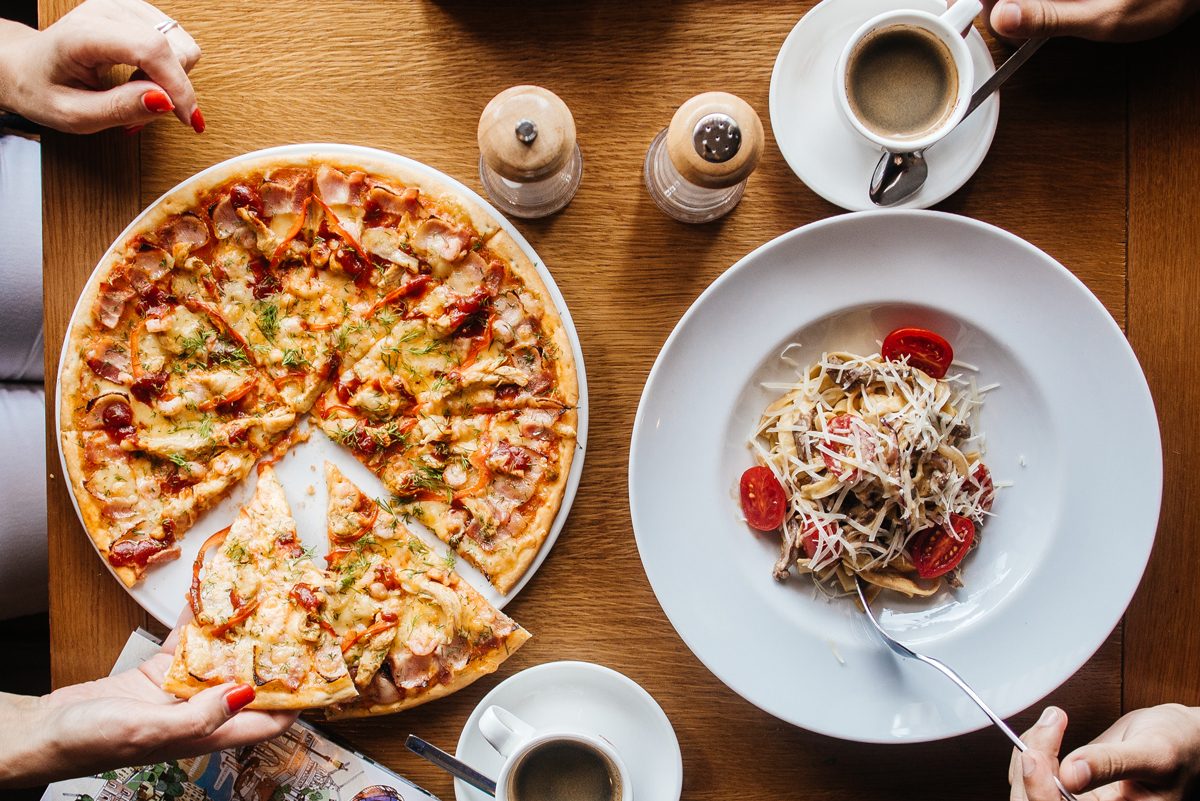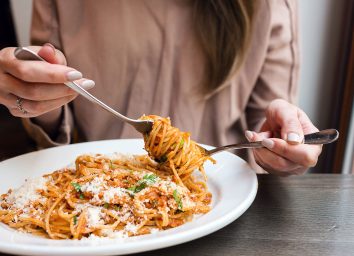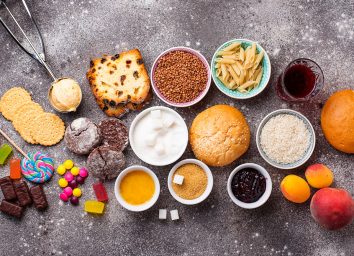The Biggest Danger Sign You’re Eating Too Many Carbs, Say Dietitians

Carbs are a big part of our everyday lives. We have cereal for breakfast, eat sandwiches for lunch, have a bag of chips for a snack, and pasta for dinner. Needless to say, it’s entirely possible that we can overdo it on carbs. And most of us are.
Americans are eating a lot of bad carbs, mostly from refined grains and added sugars. In fact, an average of 42 percent of daily calories come from low-quality carbohydrates, according to a 2019 Journal of the American Medical Association study.
As a result, we can suffer the consequences: high blood sugar, fatigue, skin issues, weight gain and more.
But note the emphasis on “bad” carbs. Carbs are not inherently bad; they’re actually an important part of your diet.
“Carbohydrates are important because they are the body’s primary source of fuel for energy and daily functions,” says Trista Best, MPH, RD, LD, a registered dietitian at Balance One Supplements.
There are two types of carbs, simple and complex, and Best tells us that you have to watch out for the simple carbs. “Simple carbohydrates come from processed and refined foods like convenience snacks foods. This form of carbohydrate is broken down quickly and used immediately by the body for energy,” explains Best.
On the other hand, complex carbohydrates are considered “good,” and refers to whole grains like oats, quinoa or brown rice, and more. “They are more nutrient-dense and provide the body with more than a quick glucose spike and stored fat,” says Best. Complex carbs tend to be low on the glycemic index (GI)—a measure of how quickly your blood sugar spikes and falls after consuming a food—whereas simple carbs are high.
Studies show that diets that contain moderate levels of good-quality complex carbs are more effective than high-GI diets at reducing body weight and controlling glucose and insulin metabolism. In other words: to be healthy, you can eat carbs, not too much, and mostly the complex type.
Before you can make any dietary changes or corrections, you first have to establish whether you’re eating too many carbs in the first place. That’s why we asked registered dietitians to share with us the danger sign you should be watching out for to assess your carb intake, and they agreed on this one thing.
There is one warning sign that stands out among all the signs you’re eating too many carbs: that you feel bloated and heavy.
“Eating too many processed carbohydrates leads to abdominal bloating because your body has to store more water in order to store the energy from the carbohydrates,” says Megan Byrd, RD, a dietitian with the food blog The Oregon Dietitian. “If you’ve ever had a carb-heavy day and ended up gaining 4-5 lbs afterward, that’s water retention.”
When you eat too many carbs, your body can’t use all that energy at once. The solution? Store it. “When you eat carbs, muscles will store extra carbohydrates that you don’t use immediately for energy as glycogen, which holds water and contributes to that heavy feeling that you’ll feel soon after eating carbs,” say Lyssie Lakatos, RDN, CDN, CFT & Tammy Lakatos Shames, RDN, CDN, CFT, of The Nutrition Twins.
Another reason why carbs can cause bloating is due to the type of ultra-processed foods you find refined carbs in.
“Most people tend to overeat carbohydrates that are refined, sugary and/or salty. Sugar and salt both make the body hold onto water to dilute them and restore the body’s fluid balance, which contributes to feeling uncomfortably puffy,” say The Nutrition Twins.
Some of the bloating you’ll experience with eating too many carbs is temporary, but you may also notice that if you’ve been eating too many carbs over a longer period of time, this bloating and water weight may end up turning into fat gain.
“Refined carbohydrates are more likely to be high in calories since they’re typically laden with fat and sugar, and this contributes to weight gain. Overeating anything over time leads to weight gain and if you’re consistently feeling a bit puffy due to overeating carbs, then it’s quite likely this will lead to more than temporary weight gain,” explain The Nutrition Twins.
How can you tell that you’re feeling bloated because of eating too many carbs or if it’s something else?
Excessive abdominal bloating can come from many things, from food intolerances to excessive salt intake. There are a couple of ways to determine whether this bloating is due to eating too many carbs.
One is to identify the location of your bloating: “You can tell if you’ve had too much salt vs. carbs because salt tends to cause water retention in your extremities, like your feet, ankles, and fingers. Carbohydrates cause bloating in your abdominal region,” explains Byrd.
Another is to perform a small dietary intervention: “A good way to test if it’s the carbs or another factor is to eat only one-half cup serving of a wholesome, high-fiber carb (such as oatmeal and or sweet potatoes), at your meal and see if the fatigue, heaviness, and weight gain resolve themselves,” recommend The Nutrition Twins.
How to fit carbs into a healthy diet.
Carbs can be a part of a healthy diet—as long as you choose healthy carbs.
“The healthiest way to eat carbs is by choosing complex carbs, like sweet potatoes, quinoa, beans and lentils, berries, whole wheat products, and squash. By avoiding those simple, refined carbohydrates, you’ll help combat the bloating,” says Byrd.
Complex carbs are higher in fiber than simple carbs, and “the fiber will help slow down the rate of absorption and lessen the blood sugar spike,” explains Alicia Galvin, RD, a resident dietitian for Sovereign Laboratories.
There are also ways you can pair carbs with other macronutrients so the other foods can help slow your body’s digestion of the carb.
“I tell people to never eat a naked carb. Always pair a fat (olives, avocado, olive oil, nuts/seeds/nut butters) and if possible a protein (egg, jerky, beans, dairy) with a carb so that you have a balance of energy and the carb won’t spike blood sugar as much,” recommends Galvin. (Related: 15 Best Snack Combos That Double Weight Loss)
If you feel like you’re struggling to determine if you’re eating too many carbs, you can always seek out expert support.
“If you’re wondering if you are overdoing it, meet with a registered dietitian. Right now, KIND is offering 3,000 free registered dietitian sessions for folks to learn more about their individual nutritional needs. This is great for people that may be struggling with these types of physical challenges,” recommend The Nutrition Twins. You can register for the program here.
For more healthy eating news, make sure to sign up for our newsletter!







